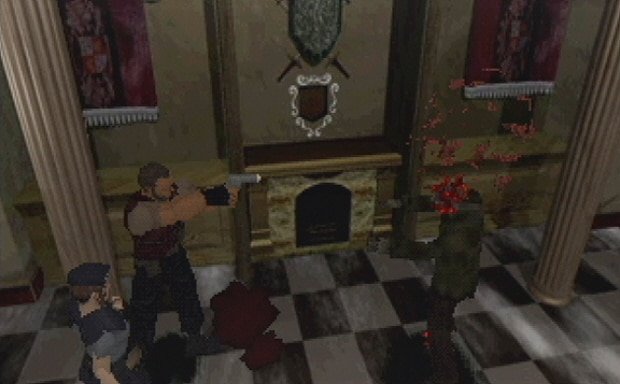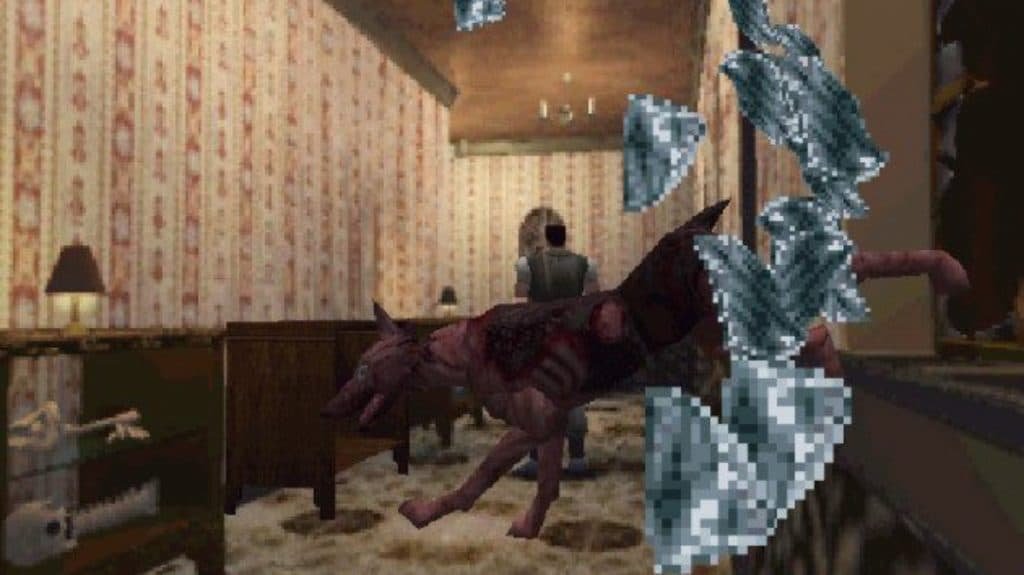A digital review copy of this book was provided to Geek to Geek by Boss Fight Books. You can pre-order it on Amazon or their website today.

Wow! What a Difference!
There are few who would argue that 1996’s Resident Evil isn’t the most important horror-themed video game ever created. The game that coined the term “survival horror” sent shockwaves through the industry while, well, shocking the sensibilities of millions of gamers who had never experienced anything like it. I was fortunate enough to have played the game shortly after it was released, and have extremely fond and vivid memories of the experience.
Before I owned a Sony PlayStation, I rented one for a weekend from Blockbuster Video specifically to play Resident Evil. I was 13 at the time, but somehow managed to convince my normally overprotective parents to allow me to play the game. Excited to see what all the video game magazines were raving about, I tossed the console and game into a bag and headed over to my friend John’s house, eager for a weekend of frightening virtual exploration.
As a kid who had pretty much only played cartridge games with built-in saves via battery, I had no notion of memory cards, so sadly my time with Resident Evil was ephemeral, to say the least. We made it several hours in, all the way to the boss fight against the giant snake, “Yawn,” at which point I was promptly swallowed whole and forced to restart from the very beginning of the game. If only Blockbuster had the foresight to rent out memory cards with their consoles as well…

Standing on the Shoulders of Eldritch Monstrosities
But wait – this is supposed to be a book review, right? In Boss Fight Books’ Resident Evil by Philip J Reed, the author reminisces about his own experience with the game as a teen, and how it helped mold him into the diehard horror fan he is today. Reed’s early relationship with the game eerily mirrors my own, and I would imagine many other fans of the series’ as well. It was a game unlike any other that brought feelings of exhilaration and anxiety out of its audience, which was largely composed of adolescents who, frankly, probably didn’t need any more emotional complexities introduced into their lives.
Reed wisely addresses the elephant in the room early on by noting Resident Evil’s similarities to 1992’s Alone in the Dark. Both games are horror-themed, with a male or female protagonist exploring a creepy mansion while avoiding monsters. Both games have fixed, cinematic camera angles, environmental puzzle-solving, and an emphasis on atmosphere and suspense over action. Reed notes that although derivative of AitD, Resident Evil improved on its forebear’s template in every conceivable way, and I agree wholeheartedly.
“Let the Danger-tainment Begin!”
Much is made in the book of Shinji Mikami’s masterful direction, and how it significantly elevates the experience. Many examples are cited, but I particularly enjoyed reading the author’s praise of the game’s “willingness to adapt and respond to a player’s decisions” early on, when your character can either use the majority of their ammunition to take down a single zombie, or lead it back to a non-player character who will take it down himself, saving the player some precious ammo.
Reed’s book is about far more than the game’s mechanics and his own history with it. It also examines the concepts of fear and suspense on a psychological and sociological level, detailing through interviews with professional psychologists why, sometimes despite a disdain for horror, so many people are innately drawn to games like Resident Evil. It is suggested that this style of horror game can even be therapeutic for those who suffer from anxiety and various phobias.

“You ever wish you could go back in time??”
My favorite portion of the book focuses on interviews with the actors who brought the game’s cast to… life? Making fun of “awkward dad” character Barry Burton is a favorite pastime for fans of Resident Evil, but the interviews with both his live action and voice actors really changed how I view the performances. I feel bad for the voice actor in particular, who seems like a genuinely nice and talented guy, and whose bizarre performance could and should be blamed on weak direction and a language barrier.
The actor who portrayed protagonist Chris Redfield in the live action intro and ending was similarly affable in interviews, and it’s hard not to root for the guy after hearing his excitement at the prospect of appearing as the character again in the next movie adaptation. There are also interviews with the actors who portrayed Wesker and Rebecca, but sadly, Jill’s actresses – both for voice and live action – were not identified by the time the book was completed (the live action actress has since been identified and interviewed). The fun interviews sprinkled throughout the book make me drool at the idea of a proper documentary film chronicling the game’s creation and legacy.
Hammering Out the Flaws
Another entertaining aspect of the book is its examination of the game’s initial critical reception, and of publisher/developer Capcom’s, uh, let’s just say inaccurate press releases. Much as it is fun to look back at old critic reviews of film favorites like Star Wars to see how off the mark some reviews were, Reed pokes fun at some of the game’s earliest reviews, many of which were written by critics who clearly didn’t play much of the game and cite the inaccurate information from Capcom’s press release, such as the use of crossbow and hammer items that do not appear in any version of the game.
I would recommend Boss Fight Books’ Resident Evil to anyone with even a semblance of fondness for horror in a heartbeat. And yes, that goes beyond horror video games, as the book is a love letter to the genre in general, with chapter titles named after obscure horror flicks, and even a foreword by B-movie legend and creator of Troma Entertainment, Lloyd Kaufman. It’s an extremely entertaining look at all aspects of horror, as well as an unexpectedly touching story of growing up in a small town with only movies and games to occupy one’s time. Keep an eye out for the book when it releases soon!

